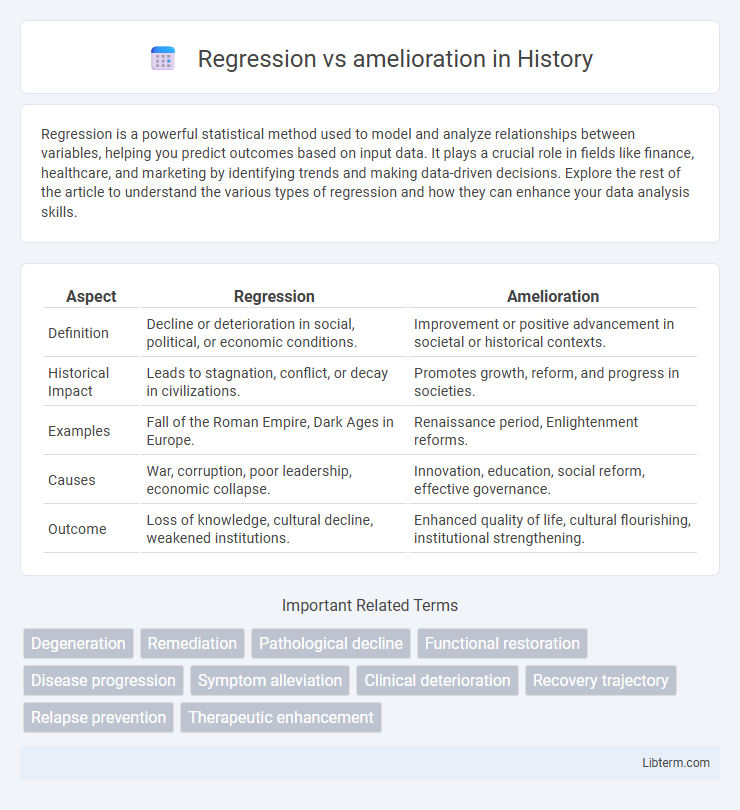Regression is a powerful statistical method used to model and analyze relationships between variables, helping you predict outcomes based on input data. It plays a crucial role in fields like finance, healthcare, and marketing by identifying trends and making data-driven decisions. Explore the rest of the article to understand the various types of regression and how they can enhance your data analysis skills.
Table of Comparison
| Aspect | Regression | Amelioration |
|---|---|---|
| Definition | Decline or deterioration in social, political, or economic conditions. | Improvement or positive advancement in societal or historical contexts. |
| Historical Impact | Leads to stagnation, conflict, or decay in civilizations. | Promotes growth, reform, and progress in societies. |
| Examples | Fall of the Roman Empire, Dark Ages in Europe. | Renaissance period, Enlightenment reforms. |
| Causes | War, corruption, poor leadership, economic collapse. | Innovation, education, social reform, effective governance. |
| Outcome | Loss of knowledge, cultural decline, weakened institutions. | Enhanced quality of life, cultural flourishing, institutional strengthening. |
Understanding Regression and Amelioration
Regression refers to the process where a linguistic form or meaning deteriorates or becomes less favorable over time, often resulting in negative connotations or reduced usage. Amelioration involves the improvement or upgrading of a word's meaning to a more positive or prestigious sense, enhancing its social or cultural value. Understanding regression and amelioration requires analyzing semantic shifts through historical linguistics, examining how societal changes influence language evolution.
Key Differences Between Regression and Amelioration
Regression refers to a process where a linguistic form or meaning deteriorates over time, leading to a loss of original clarity or nuance, whereas amelioration involves the improvement or elevation of a word's meaning to a more positive connotation. Key differences lie in their semantic trajectories: regression results in negative semantic shifts like pejoration, while amelioration causes positive semantic shifts enhancing a term's status. These opposite paths reflect how language evolves through changes in social attitudes and usage patterns, impacting vocabulary meaning and function.
Definitions: What is Regression?
Regression refers to a psychological or behavioral phenomenon where an individual reverts to an earlier stage of development or less mature behavior in response to stress or conflict. This defense mechanism often manifests as a retreat to childhood behaviors, such as tantrums or dependency, to cope with difficult emotions or situations. Understanding regression is crucial in clinical psychology to differentiate it from other symptoms and to implement appropriate therapeutic interventions.
Definitions: What is Amelioration?
Amelioration refers to the linguistic process where a word develops a more positive meaning over time, transforming its connotations to reflect improvement or enhancement. This semantic shift contrasts with regression, where a word's meaning deteriorates or becomes more negative. Understanding amelioration is essential in historical linguistics for tracing how language evolves to reflect changing social attitudes and values.
Causes and Triggers of Regression
Regression in behavior or development often stems from emotional stress, trauma, or environmental changes, causing a temporary return to earlier developmental stages. Triggers such as illness, family conflict, or overwhelming anxiety disrupt coping mechanisms, leading to a decline in previously acquired skills. Understanding these causes helps differentiate regression from amelioration, where progress signifies recovery and improvement rather than setback.
Factors Influencing Amelioration
Factors influencing amelioration include genetic predisposition, environmental conditions, and intervention strategies, which collectively determine the extent of symptom improvement. Neuroplasticity plays a crucial role, allowing the brain to adapt and recover function over time. Early diagnosis and consistent therapeutic efforts significantly enhance the likelihood of sustainable amelioration in patients.
Real-World Examples of Regression
Regression in real-world contexts often appears in urban decay, where once-thriving neighborhoods deteriorate due to economic decline, leading to increased crime and deteriorated infrastructure. In healthcare, regression manifests when patients relapse after initial improvement, as seen in chronic diseases like diabetes, where lapses in management cause deterioration. Environmental examples include deforestation reversing previous conservation gains, resulting in biodiversity loss and altered ecosystems.
Practical Applications of Amelioration
Amelioration in practical applications involves the improvement of existing systems or conditions by introducing positive changes that enhance performance, efficiency, or user experience. Unlike regression, which refers to a decline or return to a previous, less effective state, amelioration targets measurable advancements in areas such as software development, environmental management, and healthcare. Industries leverage amelioration techniques to implement upgrades, optimize workflows, and promote sustainable practices that drive long-term growth and resilience.
Comparing Outcomes: Regression vs Amelioration
Regression results in a decline in health or functionality, often reversing previous progress and leading to worsened conditions or symptoms. Amelioration involves improvement or mitigation of symptoms, contributing to enhanced patient outcomes and quality of life. Comparing outcomes, regression signifies setbacks that may require intensified interventions, while amelioration indicates positive therapeutic effects and recovery trajectories.
Choosing the Right Approach: When to Use Each
Choosing between regression and amelioration depends on the specific goals and context of the problem. Regression is ideal for predicting continuous outcomes and understanding relationships between variables, while amelioration focuses on improving or enhancing existing conditions or processes. Use regression when quantifying trends or forecasting values, and opt for amelioration when the aim is to optimize performance or reduce negative impacts.
Regression Infographic

 libterm.com
libterm.com